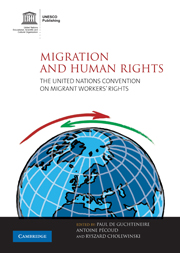Book contents
- Frontmatter
- Contents
- List of figures
- List of tables
- Notes on contributors
- Abbreviations
- 1 Introduction: The UN Convention on Migrant Workers' Rights
- PART I
- PART II
- 7 Obstacles to, and opportunities for, ratification of the ICRMW in Asia
- 8 Obstacles to ratification of the ICRMW in Canada
- 9 Mexico's role in promoting and implementing the ICRMW
- 10 Migrants' rights after apartheid: South African responses to the ICRMW
- 11 Policy on the ICRMW in the United Kingdom
- 12 The French political refusal on Europe's behalf
- 13 Migration and human rights in Germany
- 14 Migration and human rights in Italy: prospects for the ICRMW
- 15 The ICRMW and the European Union
- Annex 1 International Convention on the Protection of the Rights of All Migrant Workers and Members of Their Families Adopted by General Assembly Resolution 45/158 of 18 December 1990
- Annex 2 Ratifications of ILO Conventions 97 and 143 and of ICRMW as at June 2009
- Index
- References
11 - Policy on the ICRMW in the United Kingdom
Published online by Cambridge University Press: 02 December 2010
- Frontmatter
- Contents
- List of figures
- List of tables
- Notes on contributors
- Abbreviations
- 1 Introduction: The UN Convention on Migrant Workers' Rights
- PART I
- PART II
- 7 Obstacles to, and opportunities for, ratification of the ICRMW in Asia
- 8 Obstacles to ratification of the ICRMW in Canada
- 9 Mexico's role in promoting and implementing the ICRMW
- 10 Migrants' rights after apartheid: South African responses to the ICRMW
- 11 Policy on the ICRMW in the United Kingdom
- 12 The French political refusal on Europe's behalf
- 13 Migration and human rights in Germany
- 14 Migration and human rights in Italy: prospects for the ICRMW
- 15 The ICRMW and the European Union
- Annex 1 International Convention on the Protection of the Rights of All Migrant Workers and Members of Their Families Adopted by General Assembly Resolution 45/158 of 18 December 1990
- Annex 2 Ratifications of ILO Conventions 97 and 143 and of ICRMW as at June 2009
- Index
- References
Summary
Introduction
This chapter reviews the policy debate in the United Kingdom concerning the ICRMW. The first section argues that non-ratification by the United Kingdom is a consequence both of the Convention's implications for immigration policy and of the United Kingdom's desire to avoid international commitments with respect to immigration policy. The second section shows the growth in support for the Convention among trade unions, NGOs, members of parliament and others. One implication is that the Convention has the potential to influence public policy in the United Kingdom, even in the probable absence of ratification.
The migration context in the United Kingdom helps to explain the interest in the Convention. The years after 2000 saw public policy favour inward labour migration at all skill levels and a significant increase in the number of migrant workers actually admitted. The Highly Skilled Migrants Programme, introduced in January 2002 to enable those with high earnings and qualifications to take employment or self-employment, led to over 6,000 successful applications by June 2004. The total number of work permits issued or extended rose from 54,000 in 1997 to a peak of 153,000 in 2003. Quotas for temporary, low-skilled schemes also increased – from roughly 10,000 places in agriculture from 1997 to 2000, to roughly 45,000 places in 2003, made up of 25,000 in agriculture, 10,000 in hospitality and 10,000 in food processing.
- Type
- Chapter
- Information
- Migration and Human RightsThe United Nations Convention on Migrant Workers' Rights, pp. 278 - 294Publisher: Cambridge University PressPrint publication year: 2009
References
- 2
- Cited by

